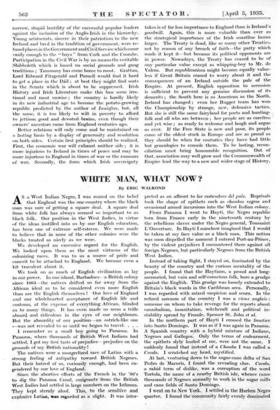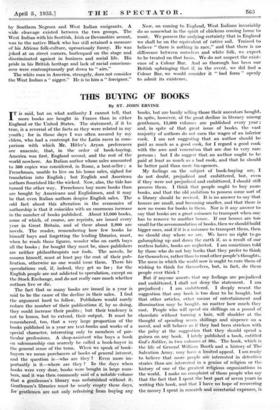WHITE MAN, WHAT NOW?
By ERIC WALROND
A S a West Indian Negro, I was reared on the belief that England was the one country where the black man was sure of 'getting a square deal. A square deal from white folk has always seemed so important to us black folk. Our position in the West Indies, in virtue of the ideas instilled into us by our English education, has been one of extreme self-esteem. We were made to believe that in none of the other colonies were the blacks treated as nicely as we were.
We developed an excessive regard for the English. We looked upon them as the most virtuous of the colonizing races. It was to us a source of pride and conceit to be attached to England. We became even a bit truculent about it.
We took on as much of English civilization as lay in our power. In one island, Barbadoes—a British colony since 1605—the natives drifted so far away from the African ideal as to be considered even more English than are the English themselves ! Our love of England and our wholehearted acceptance of English life and customs, at the expense of everything African, blinded us to many things. It has even made us seem a trifle absurd and ridiculous in the eyes of our neighbours. But the absurdity of our position—an ostrich-like one —was not revealed to us until we began to travel. . . .
I remember as a small boy going to Panama. In Panama, where thousands of British West Indians had settled, I got my first taste of prejudice—prejudice on the grounds of my British nationality !
The natives were a mongrelized race of Latins with a strong feeling of antipathy toward British Negroes. But their hatred of us, curiously enough, had been en- gendered by our love of England.
Since the abortive efforts of the French in the '80's to dig the Panama Canal, emigrants from the British West Indies had settled in large numbers on the Isthmus. They kept sternly aloof. This, to the .sensitive and explosive Latinit, was regarded as a slight. It was inter- preted as an affront to las cosiumbres del pais. Reprisals took the shape of epithets such as clumbos vegros and occasional armed incursions into the West Indian colony.
From Panama I went to Hayti, the Negro republic torn from France early in the nineteenth century by the rebellious slaves under the Negro general, Toussaint L'Ouverture. In Hayti I somehow imagined that I would be taken at my face value as a black man. This notion was soon dispelled the moment I entered Port-au-Prince, by the violent prejudices I encountered there against all foreign Negroes, but particularly Negroes from the British West Indies.
Instead of taking flight, I stayed on, fascinated by the beauty of the country and the curious mentality of the people. I found that the Haytians, a proud and long- memoried, but vain and self-conscious folk, bore a grudge against the English. This grudge was loosely extended to Britain's black wards in the Caribbean area. Personally, I was regarded with mixed suspicion and scorn. In the refined sarcasm of the country I was a vieux anglais : someone on whom to take revenge for the reports about cannibalism, insanitation, witchcraft and political in- stability spread by Froude, Spenser St. John et al.
In the northern part of Hayti I crossed the frontier into Santo Domingo. It was as if I was again in Panama. A Spanish country with a hybrid mixture of Indians, Negroes and Gallegos. Only the terms of endearment, the epithets slyly hurled at me, were not the same. I suddenly found that instead of a Chambo I was called a Coco/o. I scratched my head, mystified.
At last, venturing down to the sugar-cane delta of San Pedro de Macoris, I found the revealing clue. Coco/o, a rabid term of dislike, was a corruption of the word Tortola, the name of a nearby British isle, whence came thousands of Negroes annually to work in the sugar mills and cane fields of Santo Domingo.
I went on to New York. I settled in the Harlem Negro quarter. I found the 'community fairly evenly dominated by Southern Negroes and West Indian emigrants. A wide cleavage existed between the two groups. The West Indian with his Scottish, Irish or Devonshire accent, was to the native Black who has still retained a measure of his African folk-culture, uproariously funny. He was joked at on street corners, burlesqued on the stage and discriminated against in business and social life. His pride in his British heritage and lack of racial conscious- ness were contemptuously put down to "airs."
The white man in America, strangely, does not consider the West Indiana" nigger." He is to him a " foreigner." Now, on coming to England, West Indians invariably do so somewhat in the spirit of chickens coming home to roo.4t. We possess the undying certainty that in England we shall be on the equivalent of tative soil. Trained to believe "there is nothing in race," and that there is no difference between ourselves and white folk, we expect to be treated on that basis. We do not suspect the exist- ence of a Colour Bar. And so thorough has been our British upbringing that if, in the event, we did find a Colour Bar, we would consider it "bad form" openly to admit its existence.











































 Previous page
Previous page